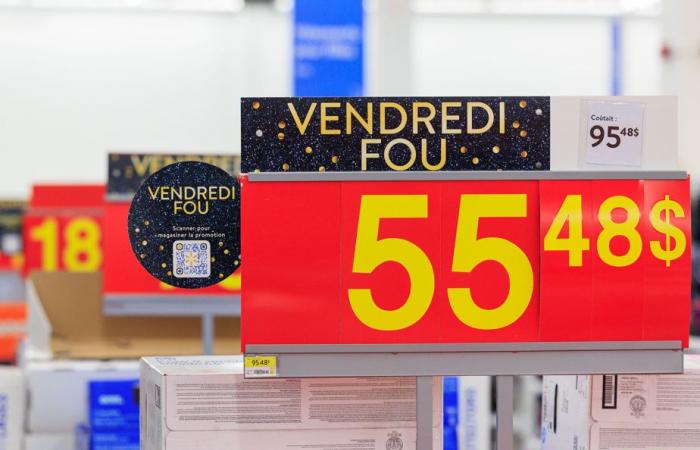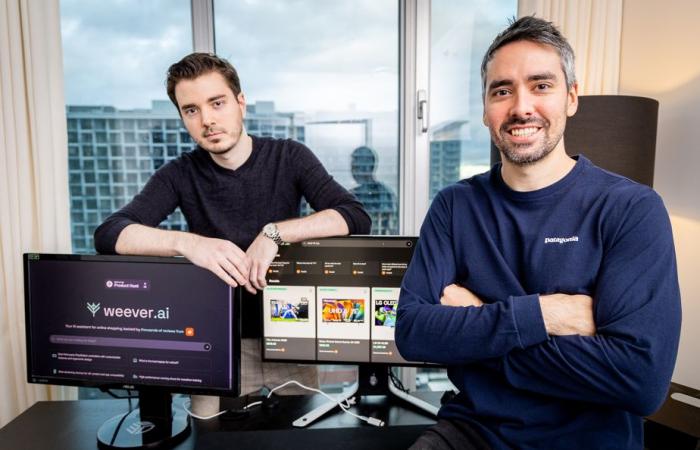To get the most out of Black Friday, you used to have to camp out in front of a Best Buy or Walmart, then rush into the store as soon as it opened. Today, savvy bargain hunters are letting ChatGPT and other artificial intelligence (AI) tools do the running for them.
Published at 7:00 a.m.
Jim Malervy, 46, a marketing executive from Philadelphia, is doing his Christmas shopping on ChatGPT for the second year. Last year, an AI app found a $50 discount on the purchase of an iPad for her eldest.
This time, he is looking for a Margot Robbie Barbie doll on in-line skates for his younger daughter. He uses several apps, including Honey from PayPal, which scours sites and finds the best prices. Its objective: a 30% discount.
No more stress in stores, and artificial intelligence eliminates the fear of missing out on the best Black Friday sale, says Mr. Malervy, who runs the AI site GPT Journal: “Sometimes it’s anxiety-inducing: we want to be sure of have the best price. »
According to a survey by the Attest group, 44% of consumers interested in Black Friday plan to use AI this year. Several AI companies, including OpenAI and Perplexity AI, have just added a shopping search function to encourage users to use their robots for Christmas shopping.
Retailers are expecting record crowds this weekend. Chains like Best Buy, often stormed on Black Friday, announced gloomy sales forecasts on Tuesday: consumers are counting their pennies and waiting for big discounts.
A glimpse of the future
The American consumer is approaching the holidays concerned about inflation, the fallout from a divisive presidential election and the multiple wars raging. He chooses his purchases carefully and seeks to make the search for reasonably priced gifts less painful.
This is prompting some consumers to entrust Christmas shopping to AI robots. Amazon, Walmart and other retailers are returning the favor and using AI to make their discounts easier to spot.
“It’s a glimpse of the future, I think,” says John David Rainey, Walmart’s chief financial officer, who is working on AI tools that can make product searches easier.
Frédéric Bourgeois-LeBlanc, a 32-year-old Montrealer, used to go to Best Buy to buy the latest gadgets. But shopping for the best price now involves too much stress and research, he believes.
A Montreal discount tracker
Moving away from review sites and online tutorials, he turned to Weever.ai, a new site that lets shoppers ask questions and get product recommendations. These days, Mr. Bourgeois-LeBlanc is looking for a gaming headset for his Xbox console. According to him, AI makes it easier for “someone like [lui] who is not used to in-depth research” in shopping.
At Weever, we expect a surge of users. “We know that a tidal wave is coming,” says Frédéric Marcoux, co-founder and CEO of Weever. Perplexity AI, which has just launched a shopping bot, also reports an increase in searches for the words “Black Friday” and “Cyber Monday”.
PHOTO DOMINICK GRAVEL, LA PRESSE
The co-founders of Weever.ai, Julien Campeau and Frédéric Marcoux
Weever.ai
The Weever.ai bargain hunter was launched in June 2024 by tech entrepreneur Frédéric Marcoux and software developer Julien Campeau, two Montrealers. The AI tool has been fully operational since August. The approach of Black Friday benefits him greatly: “At the end of August, we had 1,500 visits per month, but in mid-November, we already had 14,000 visits,” says Mr. Marcoux. Unlike other AI bargain hunters, Weever.ai is not a conversational robot: “It looks more like a shopping platform where you see the suggested products,” says Mr. Marcoux, who became teeth into the app niche by launching an expense-sharing app called Let’s Split. “What the AI does in Weever.ai,” explains Mr. Campeau, “is read tens of thousands of product reviews and evaluations written by consumers, then correlate that with the product sought or the need expressed by the user. ‘user’, in addition to integrating the price and the online retailer to make a recommendation.
AI tools could revamp a Black Friday tradition, where consumers plan an entire day of shopping, from one establishment to another. Instead of organizing the day based on opening hours and deals, ChatGPT can provide an itinerary for that day for even the most intense extreme shopping enthusiasts.
Example: ChatGPT was asked for a schedule of Black Friday in New York. The robot suggested a 12-hour expedition starting at 6:30 a.m. with a visit to Macy’s in Herald Square, followed by “luxury” stops on the 5e Avenue, “trendy finds” in SoHo, “electronics/photos” at Best Buy and B&H, then a trip to the Strand bookstore. The route included a snack at Chelsea Market around midday as well as advice: “hydrate and wear comfortable shoes, the walking and crowds can be intense”.
But it’s clear that generative AI like ChatGPT needs refinement. She relies on probabilities in her answers, which in some cases are inaccurate or outdated.
So when asked about a second Black Friday shopping trip to New York, ChatGPT suggested a meal stop at the Plaza Hotel food court, which has been closed for years.
Spot the good deals
In many cases, according to shoppers, the best discounts are no longer found in stores or highlighted by retailers on their websites. In the age of dynamic and changing pricing, buyers need to work harder.
“Sometimes you find deals from 2020,” says Lisi, 17, a student and online influencer who goes by Lisi Shops on YouTube and TikTok (she asked Bloomberg not to disclose her last name).
Lisi learned about AI in a class at school and came up with the idea of using ChatGPT to find sales after wasting hours searching for them online. His Black Friday takes place largely on the internet.







